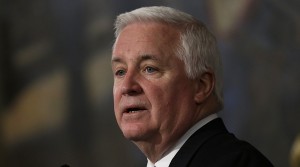Corbett looks to defer $300 million in PA pension payments

By Eric Boehm | PA Independent
Facing $2 billion in mandatory pension payments next year, Gov. Tom Corbett is looking for a way out.
On Tuesday, Corbett outlined his budget proposal for the 2014-15 fiscal year, which begins July 1, and called for the General Assembly to defer about $300 million in pension payments at the state and local level next year. Though the deferments will add to the state’s long term pension costs — already exceeding $47 billion and set to grow as high as $65 billion within a few years — the administration promised to offset the additional costs with changes in benefits for new employees.
PAYING THE BILLS: With an election around the corner, Gov. Tom Corbett proposed increases in spending on several parts of the state budget. Paying the pension bill was not one of them.
“We must fix this,” Corbett said. “The only question is whether we will do it now, when it’s still a manageable problem, or let others do it later, when it’s an all-out crisis.”
Corbett’s plan would yield $170 million in state-level savings by deferring part of the $600 million increase in pension cost this year. Another $130 million in savings would be realized at the school district level, since schools pay about half of the retirement cost for their employees.
But the word “savings” is a bit of a misnomer in this instance. That $300 million — and much more — will still have to be paid.
Corbett is proposing a reduction in the so-called “collars” that were put in place in 2010 to artificially lower the state’s annual pension contributions.
Paying less into the pension systems means the state and school districts will have more money to spend on other things this year. But just like deferring payments on a mortgage or credit card bill, that doesn’t really save money.
“It’s savings in your budget for this year. It’s not savings in the sense of savings,” said James McAneny, executive director of the state Public Employees Retirement Commission, which advises the Legislature on pension issues. “It’s a budgetary action that does not reduce any of the funding problems with the pensions.”
The state hasn’t fully funded the pension systems since 2003, and each deferral in payments has added to the unfunded liability that must be paid some day.
An analysis by the House Democratic Appropriations Committee said reducing the collars would add $13 billion to the unfunded liability over the next 30 years.
PENSION PENNIES: Pennsylvania’s two pension funds have a combined unfunded liability of more than $47 billion. That’s expected to grow to as much as $65 billion within a few years.
Budget Secretary Charles Zogby said the added costs by deferring the payments this year will be made up for with changes in the long term that affect future benefits, but the administration didn’t lay out a specific plan for what those changes would be. That will be left to the General Assembly to hammer out between now and the end of June.
Zogby said any changes would have to shift the risk from the state and school districts to state workers, so taxpayers wouldn’t be left holding the bag for future funding crises.
Last year, Corbett proposed moving current workers and future hires into a new 401(k)-style system and closing current pension plans. That would achieve his goal of reducing the state’s risk in the investments, but the General Assembly was unwilling to make changes that affect current employees because of the threat of legal action from public sector unions.
“Inaction is unwise in the extreme, and deeply unfair to our children, communities and schools,” Corbett said.
This year, it seems the focus will be on changes only for future hires.
“We made our agreements there. We need to abide by those agreements,” said House Majority Leader Mike Turzai, R-Allegheny, who is advocating for a new 401(k)-style system for new workers.
Democrats jumped on Corbett’s plan to short-change pension funds again.
“Everyone knows that it’s a bad idea to make less than the minimum payment on your credit card. That is essentially what the governor is asking us to do,” said House Minority Leader Frank Dermody, D-Allegheny.
Dermody pointed to the state’s history of underfunding the pension system. He said state workers and public school employees have always paid their contributions, even while the state has not.
Pennsylvania hasn’t fully funded the pension system since 2003. That year, the Legislature voted to take a decade-long “pension holiday” under the assumption that robust investment returns would make up for lower contributions. When that failed to happen and the state was on the hook for increasing costs, the Legislature approved Act 120 of 2010 to institute the collars, artificially lowering obligations.
Corbett also called for the Legislature to end the so-called “double dip” reimbursement of pension costs to charter and cyber charter schools. That’s currently part of a large charter school overhaul bill that has been the subject of much debate in the Legislature for more than two years.
A one-time transfer of $225 million from the Tobacco Settlement Fund would help offset school district payments to the state’s Public School Employees Retirement System.
Boehm is a reporter for PA Independent and can be reached at Eric@PAIndependent.com. Follow @PAIndependent on Twitter for more.
The post Corbett looks to defer $300 million in PA pension payments appeared first on Watchdog.org.







